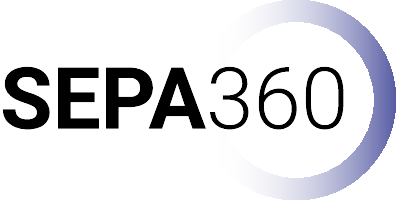News
New paper: “Evacuate everyone south of that line” Analyzing structural communication patterns during natural disasters
[ more... ]
Call for Papers: Special Issue on Semantic Technologies for Data and Algorithmic Governance
(10/20/20)Call for Papers: Special Issue on Semantic Technologies for Data and Algorithmic Governance
Technology is playing a progressively important key role in enabling
effective governance structures, processes, and frameworks. As society
becomes increasingly dependent on complex systems ranging from simple
‘decision support systems’ to ‘systems of systems’ and ‘semi autonomous
systems’, data and algorithmic governance are of utmost importance.
When it comes to data and algorithmic governance tools and techniques
there are still many open questions. For instance, to what extent do
these systems safeguard against privacy violations and honor
intellectual property rights? Can granular consent be granted, and will
the consequences be understood by its users? How can biases,
discrimination, and censorship be identified and acted on? Do
transparency and explainability lead to greater accountability? How can
trust be woven into the fabric of these systems?
Towards this end, this special issue aims to explore the development and
evaluation of semantic technologies with respect to the data and
algorithmic governance mechanisms, processes and methodologies that are
critically needed to support the development of trust-centric social and
business applications alike.
*Topics of interest*
We welcome original high quality submissions on (but are not restricted
to) the following topics:
-Findable, Accessible, Interoperable, and Reusable (FAIR) data management
-Techniques for enabling ownership, control, and access
-Identifying fake news and misinformation
-Managing bias and ensuring fairness
-Enabling transparency, explainability, and accountability
-Methods for policy governance
-Information flow control and accountability
-Measuring data quality
-Managing the data life cycle
-Metrics for assessing the effectiveness of governance algorithms
-Data privacy, regulations and compliance
-Provenance, trust and metadata for authoritative sources
-Privacy and security enforcement
-Methods for information flow control and accountability
-Frameworks and systems for personal data storage and control
-Ensuring data authenticity and integrity
-Privacy-preserving data mining and machine learning methods
-Protecting against identity theft and data falsification
-User-friendly interface design for data and algorithmic governance
-Standards for data and algorithmic governance
-Tackling legal issues with respect to data and algorithms
-Law and governance in e-democracy and e-participation
-Benchmarking approaches to data and algorithmic governance
-Building trust and transparency mechanisms in the fabric of the Web
-Participatory frameworks for fair and efficient algorithmic governance
*Deadline*
The new deadline is: January 29, 2021 (extended!). Papers submitted before the deadline will be reviewed upon receipt.
*Author guidelines*
Submissions shall be made through the Semantic Web journal website at
http://www.semantic-web-journal.net. Prospective authors must take
notice of the submission guidelines posted at
http://www.semantic-web-journal.net/authors. Note that you need to
request an account on the website for submitting a paper. Please
indicate in the cover letter that it is for the Special Issue on
Semantic Technologies for Data and Algorithmic Governance. Submissions
are possible in the following categories: full research papers, surveys,
application reports and case studies. While there is no upper limit,
paper length must be justified by content.
*Guest editors*
Michel Dumontier, Maastricht University, The Netherlands
Sabrina Kirrane, Vienna University of Economics and Business, Austria
Oshani Seneviratne, Rensselaer Polytechnic Institute, USA
The guest editors can be reached at swjgovernance@googlegroups.com.
Researcher of the Month: Sabrina Kirrane
(10/05/20)Researcher of the Month: Sabrina Kirrane
Data misuse and misinformation are key problems associated with the use of the internet today. As part of the PENNI project (Policy Enabled Next generation Internet), WU Senior Assistant Professor Sabrina Kirrane is working to build a new, decentralized internet that is based on transparency and allows users to keep more control over their data. Computer scientist Sabrina Kirrane is Researcher of the Month October.
Sabrina Kirrane earned her PhD in computer science from the National University of Ireland Galway, with a PhD thesis entitled “Linked Data with Access Control.” After working at the Galway Mayo Institute for Technology as an assistant lecturer from 2013 to 2015, she came to WU Vienna as a post-doc researcher in September 2015. Her research interests include the Next Generation Internet (NGI), distributed and decentralized systems, big data, and data science. Sabrina Kirrane has published her work in prestigious international computer science journals (e.g. Semantic Web, IEEE Security & Privacy, Knowledge Engineering Review, Personal and Ubiquitous Computing, Künstliche Intelligenz) and has presented her research at numerous international conferences. Her results have been widely discussed. In 2020, Sabrina Kirrane became a senior assistant professor at WU.
As Researcher of the Month, Sabrina Kirrane shares in her video interesting insights into her research and addresses a question that concerns all of us: What are the technological foundations needed to create an internet where citizens, companies, and organizations have more control over where their data are stored and how they are processed?
Online 360-degree Video Workshop (SEPA360)
(10/04/20)Online 360-degree Video Workshop (SEPA360)
2nd Learning and Teaching Training Event (held online due to pandemic)
| This week (8th-10th September 2020) the partners of the SEPA360 project successfully held their second Learning and Teaching Training Event (LTTE) online, due to the ongoing pandemic crisis (Covid-19). The initial event was planned to be hosted in Thessaloniki, Greece and would have brought together over 30 digital champions from interdisciplinary backgrounds in higher education. Even though the SEPA360 team transitioned the complete workshop into an online mode more than 25 digital champions were able to join the 3-day workshop and participate in breakout sessions. |
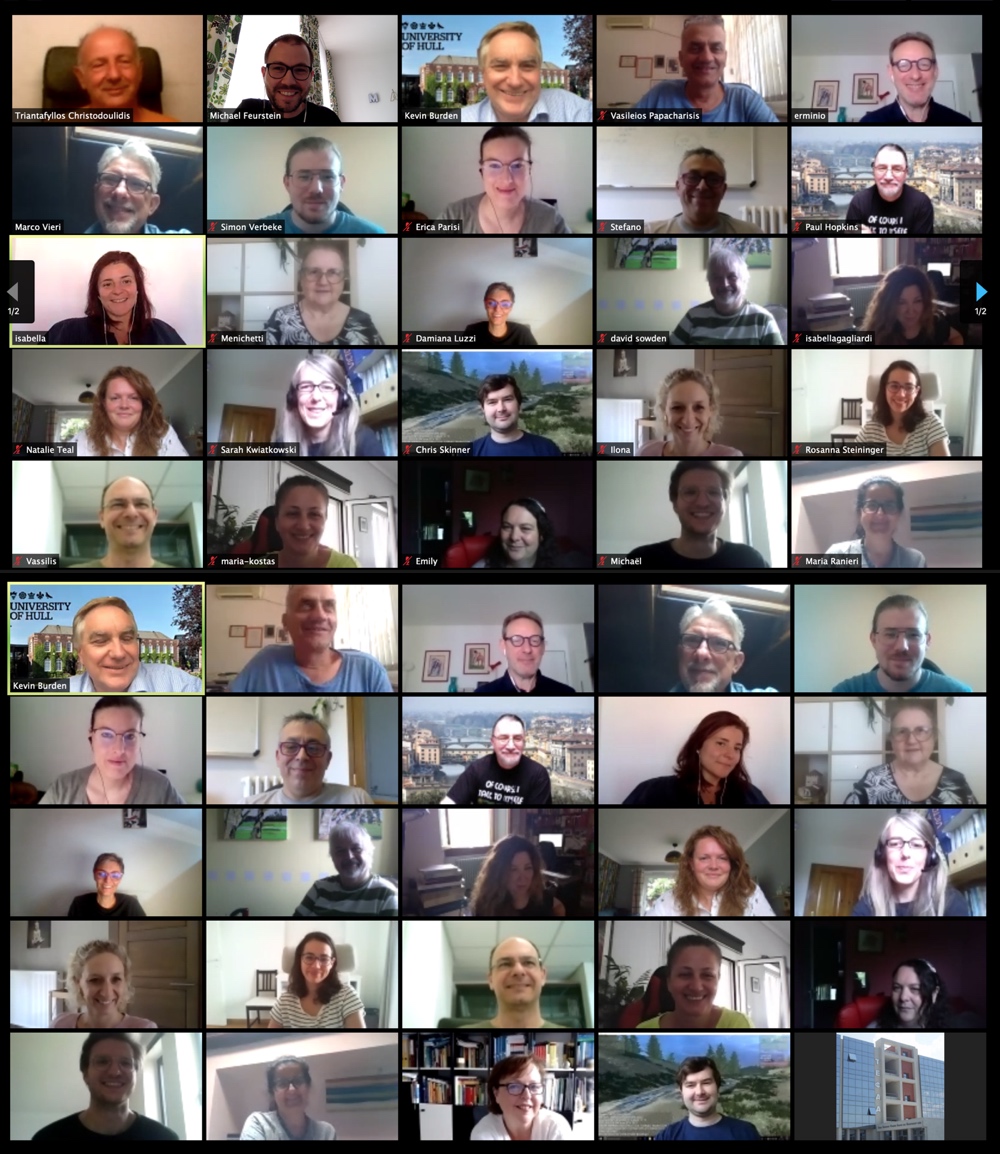
SEPA360 Virtual Group Photo (taken in July 2020).
|
The three day workshop was hosted by Prof. Dr. Kevin Burden (Coordinating Partner, University of Hull) and was split into an online morning and offline afternoon session. Each morning session included presentations of results and ongoing work, breakout sessions allowing national digital champions to work remotely on 360°-video scenarios as well as interactive feedback sessions collecting valuable input and feedback from participants. Day 1: Scoping Study and 360°-Video Scenario DevelopmentThe first day of the workshop focused on presenting first results from the scoping study led by SEPA360 partner Italy from University of Florence. A broad spectrum of research has already been done in terms of exploring the use of 360°-video in higher education providing the digital champions some inspiration of how to apply 360°-video in their own scenarios. Also, recommendations were communicated and discussed focusing on the potential of activity-oriented and explorative scenarios. |
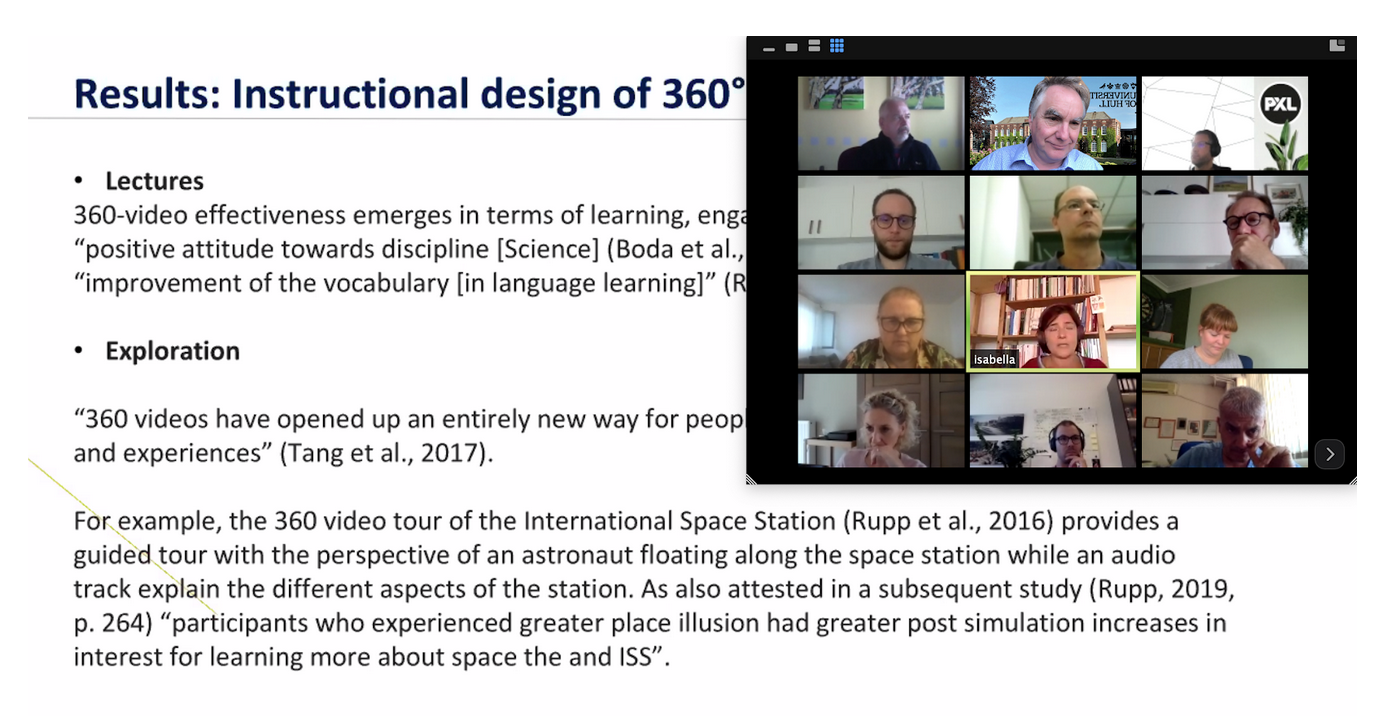
Isabella Bruni (University of Florence) presenting results from the scoping study.
|
Another session focused on introducing the digital champions to an initial set of templates enabling them to systematically develop new 360°-video scenarios. A template for preparing a scenario was presented as well as a conceptual model to get an overview of relations between different parameters influencing the design of a 360°-video scenario. Based on this input breakout sessions were organised motivating the digital champions to start designing their first 360°-video scenarios. The afternoon session was an offline session aiming at giving the digital champions time and space to explore the use and application of their 360°-video cameras and scenarios. |
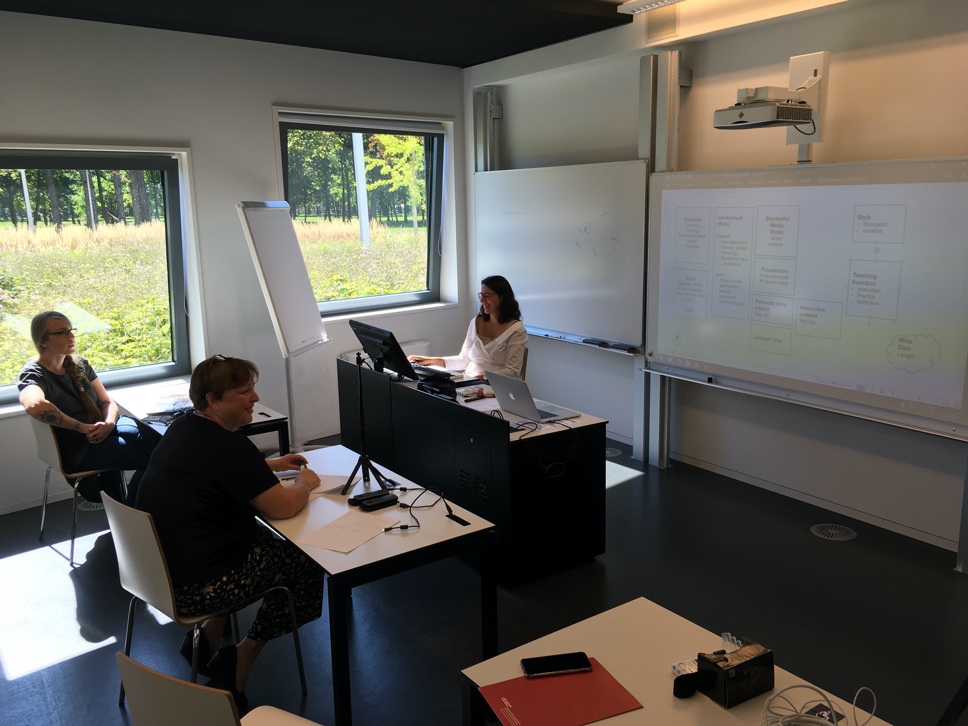
Digital Champions from WU Vienna discussing 360°-video scenario options.
Day 2: Vivista 360°-Video Editor Tutorial and FeedbackThe second day focused on getting the digital champions involved with the Vivista 360°-Video Editor software developed as an open source project at the PXL Hasselt, Belgium. It enables users to enhance 360°-video with text, images or videos, as well as allowing users to integrate interactive components such as multiple choice questions, area highlights and more. In the course of the second day the features of the editor were presented giving the digital champions an idea of what kind of interactions they could integrate into a 360°-video. Also, it was a great opportunity to collect user feedback about features they were missing or improvements they had in mind. |
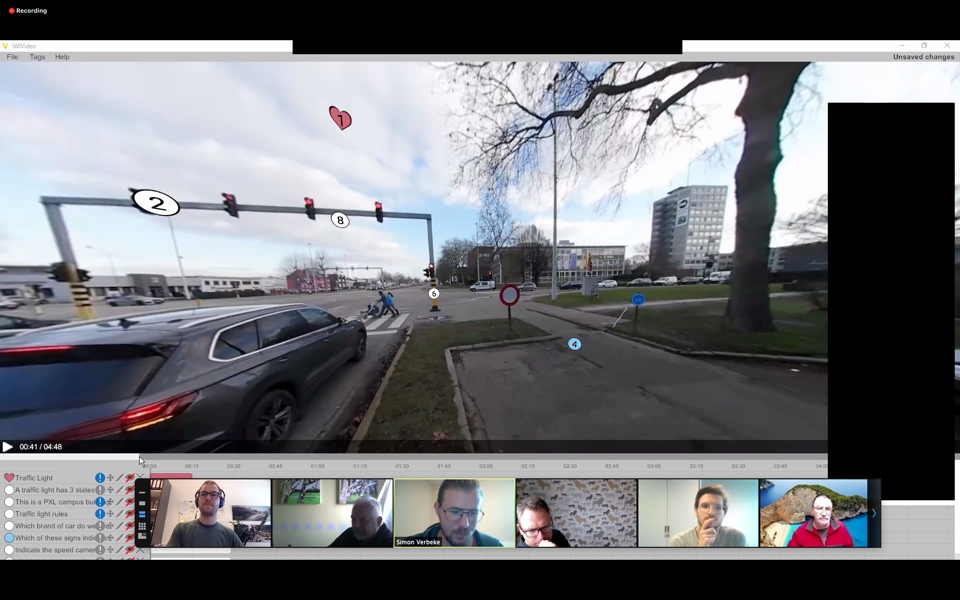
Simon Verbeke (PXL) presenting the Vivista 360°-Video Editor.
| Apart from showing how the Vivista 360°-Video Editor worked, some digital champions already could showcase their work done so far. This was an exciting opportunity to exchange ideas on possible 360°-video scenarios and get inspired by others. |
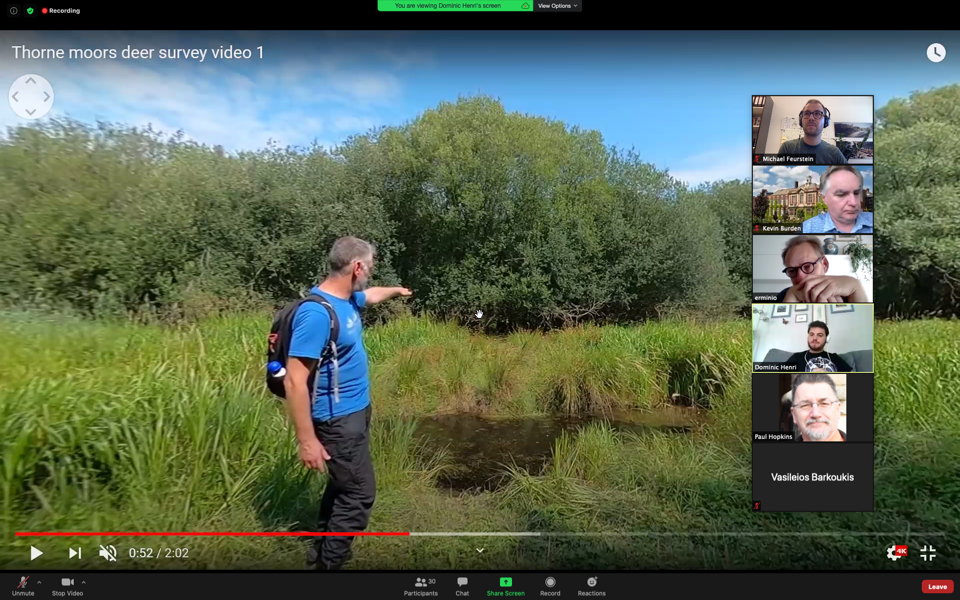
Dominic Henri (UK) presenting a 360°-video on Thorne Moors Deer Survey.
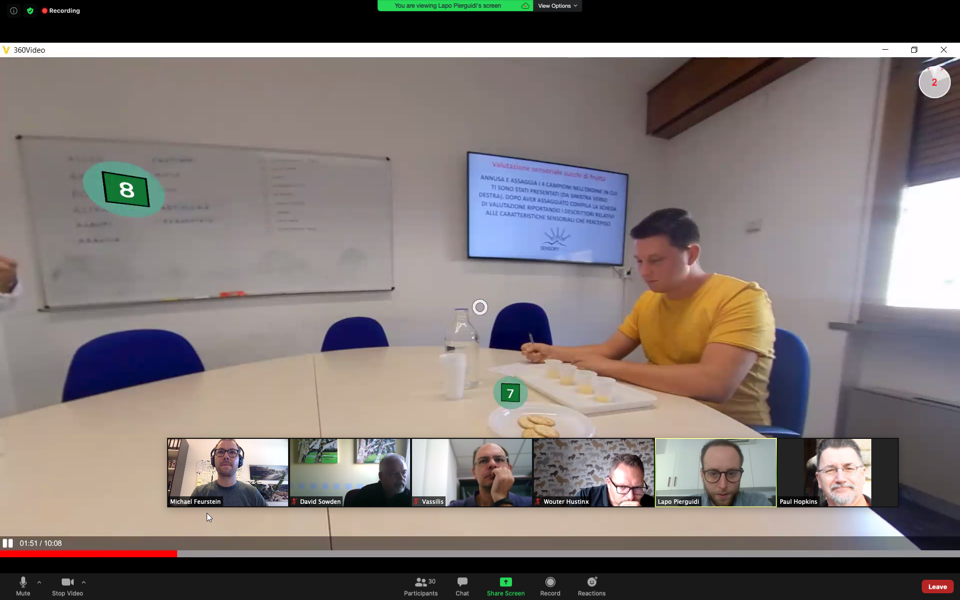
Lapo Pierguidi (Italy) presenting a 360°-video tour at a food tasting lab.
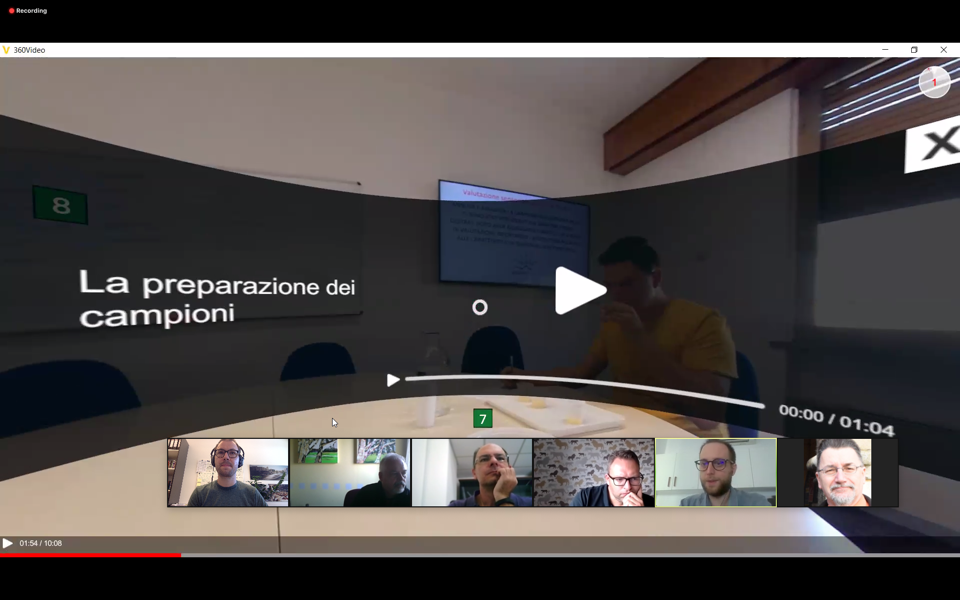
Lapo Pierguidi (Italy) presenting interactions in a 360°-video tour.
Day 3: Future Steps and some more scenariosThe last and third day focused on future steps for the SEPA360 project. Strategic concepts and thoughts on possible options for empirically evaluating 360°-video scenarios were discussed. This included break out sessions with digital champions brainstorming ideas about what is of interest to evaluate in their respective discipline. All input was collected and discussed and will prove useful for further developing scenarios and provide a concept for evaluating the effectiveness of 360°-video in terms of supporting and enhancing the learning of university students. Finally, another scenario, which was developed in the course of the three day workshop at the Vienna University of Economics and Business (WU Vienna) together with the digital champions was presented. The scenario focused on using a 360°-camera and was titled “How to setup your first in-class 360°-video recording”. |
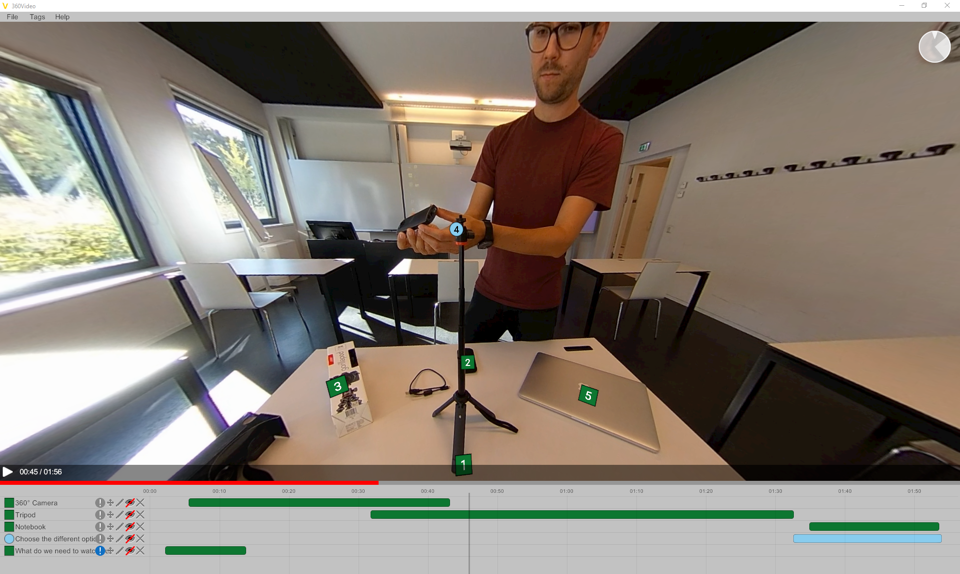
Scene with Michael Feurstein (WU Vienna) setting up a 360°-camera (Screenshot Vivista).
Follow UpThe SEPA360 team is pleased to say that the 2nd Virtual Learning Teaching and Training Event was a success. Even though everything was held in an online and virtual mode, it was a very productive environment and digital champions could discuss ideas, learn about the Vivista software project involved and further push their development of new 360°-video scenarios. If you are interested in any future updates, stay up to date and subscribe to the SEPA360 newsletter or if you want to get involved in any way, don’t hesitate to either contact Michael Feurstein or contact the SEPA360 team directly. |
Explainable AI: The human centricity challenge
Check out the recent talk on Human-centric AI challenges and opportunities by Sabrina Kirrane, which was presented as part of the AI & Policy track of the 2020 Applied Machine Learning Days Conference. In the talk Sabrina argues that applications that are able to understand constraints (in the form of goals, preferences, norms and usage restrictions), together with trust and transparency mechanisms, will give citizens more control over how their data is utilised, and will foster trustworthiness in the respective systems.
Applied ML Days Track Info: AI Policy | Youtube Video of the Talk
[ more... ]
Call for Paper: Human-centricity in a Sustainable Digital Economy | HICSS54
The 54th Hawaii International Conference on System Sciences
Mini-track on Human-centricity in a Sustainable Digital Economy
http://hicss.hawaii.edu | HICSS-54 | January 5 – 8, 2021 | Grand Hyatt Kauai
Paper Submission Deadline: June 15, 2020
The internet and the global digital transformation have changed many different aspects of our lives. Not only the economies and the societies but also people’s personal lives have been influenced by this new and ever-emerging era of our history. While the digital age has made it possible to provide novel services and solutions for the end-users, it has also caused serious concerns in different individual and societal levels, such as issues regarding online privacy, algorithmic bias, fairness and accountability of information systems, transparency, governance, and explainability of information systems, end-user manipulations, fake news, traceability, etc. The development of human-centric and end-user empowering information systems can be one approach towards “digital sustainability”, i.e. providing novel and personalized services for the end-users, while considering potential negative multi-dimensional consequences of digital transformation.
This minitrack aims to attract research that advances the understanding of human-centricity and end-user empowerment in a sustainable digital economy. It adopts an interdisciplinary perspective, which considers human-centricity and end-user empowerment across application domains (e.g. software development, digital commerce, healthcare, administration, mobile apps, social media, and online services). Topics are:
- Towards understanding and development of human-centric information systems
- Evaluation of existing information systems from a human-centric perspective
- Co-creation and co-production of human-centric sustainable information systems
- Analysis and design of technologies (e.g. AI, Blockchain) that empower end-users
- Human-centric end-user agents, AI and machine learning
- Fairness, transparency, accountability and controllability of information systems
- Privacy, GDPR, personal data on the Internet, or consent management
- Legal or economic aspects of human-centricity in information systems
- Identity and privacy management systems
- Business value of human-centric and/or user empowered solutions
- Sociotechnical studies of human-centricity in information systems
- Opportunities and challenges of digital behavior change, habit formation, and digital addiction
- Digital Nudging for increasing social or ecological responsibilities
- Ethical concerns regarding human-centricity
Publication of Papers:
HICSS is the #1 Information Systems conference in terms of citations as recorded by Google Scholar. Presented papers will be included in the Proceedings of HICSS-54. Selected papers will be invited for a fast-track in Electronic Markets – The International Journal on Networked Business.
Important Dates:
June 15, 2020: Paper Submission Deadline (11:59 pm HST)
August 17, 2020: Notification of Acceptance/Rejection
September 4, 2020: Deadline for A-M Authors to Submit Revised Manuscript for Review
September 22, 2020: Deadline for Authors to Submit Final Manuscript for Publication
October 1, 2020: Deadline for at least one author of to register for HICSS-54
Conference Dates:
January 5 – 8, 2021: Paper Presentations
Organizers:
Soheil Human, Vienna University of Economics and Business (WU Wien), Austria
Gustaf Neumann, Vienna University of Economics and Business (WU Wien), Austria
Rainer Alt, Leipzig University, Germany
About the HICSS Conference:
Since 1968, the Hawaii International Conference on System Sciences (HICSS) has been known worldwide as the longest-standing working scientific conferences in Information Technology Management. HICSS provides a highly interactive working environment for top scholars from academia and the industry from over 60 countries to exchange ideas in various areas of information, computer, and system sciences.
According to Microsoft Academic, HICSS ranks the 36th in terms of citations among 4,444 conferences in all fields worldwide. The Australian Government’s Excellence in Research project (ERA) has given HICSS an “A” rating, one of 32 Information Systems conferences so honored out of 241 (46-B and 146-C ratings). Data supplied by the Australian Research Council, December 2009.
Unique characteristics of the conference include:
- A matrix structure of tracks and minitracks that enables research on a rich mixture of cutting-edge computer-based applications and technologies.
- Three days presentations of peer-reviewed papers and discussions in a workshop setting that promotes interaction leading to revised and extended papers that are published in journals, books, and special issues as well as additional research.
- A full day of Symposia, Workshops, and Tutorials.
- Keynote addresses and distinguished lectures which explore particularly relevant topics and concepts.
- Best Paper Awards in each track which recognize superior research performance.
- HICSS is the #1 IS conference in terms of citations as recorded by Google Scholar.
- A doctoral consortium that helps participants work with senior scholars on their work-in-progress leading to journal publications.
- HICSS panels that help shape future research directions.
Author Instructions:
http://hicss.hawaii.edu/authors/
Mini-track Link:
Download Call for Paper: PDF
RESPECTeD Project: Really Enforceable Solution to Protect End-users Consent & Tracking Decisions
(12/04/19)RESPECTeD Project: Really Enforceable Solution to Protect End-users Consent & Tracking Decisions
We are delighted to inform you that the Institute of Information Systems and New Media (WU Wien) in collaboration with the Privacy and Sustainable Computing Lab, the Institute of Information Systems and Society (WU Wien), and NOYB – European Center for Digital Rights (noyb.eu) starts the interdisciplinary research project RESPECTeD. The full title of the project is “Really Enforceable Solution to Protect End-users Consent & Tracking Decisions”. Soheil Human and Ben Wagner are the project leads representing WU Wien and Max Schrems is the project lead from the NOYB-side. The project is funded by the NetIdee programme of Internet Privatstiftung Austria (IPA).
Project Motivations
RESPECTeD tackles a wide range of ongoing privacy-related issues on Internet, among others:
1. providing consents on the Internet is a time and expertise-demanding task which cannot correctly be performed by most of the users,
2. withdrawing consents is normally a sophisticated task,
3. the existing anti-tracking mechanisms (e.g. W3C’s Tracking Preference Expression – DNT) are not legally enforceable and are in many cases ignored by the service providers.
We aim to develop a mechanism to address these issues.
Project Goal
Based on an extensive study of existing patterns of tracking, we develop a detailed standard mechanism for communicating users consent and tracking decisions via HTTP headers. Moreover, a set of client-side and server-side software (e.g. web-browser plugins) support the legal enforcement of the expressed consents, e.g. by sending the required identifiers or legally binding emails.
Target Group of the Project
Almost everyone on Internet can be considered as the target group of the project:
1) end-users will finally have a mechanism to express their consent and tracking decisions in a manner, which not only is human-cetnric, user-friendly and easy- to-use, but also lawfully and technically enforceable;
2) service providers (data controllers) will be provided by a clearly defined technical mechanism and supporting codes to gain and respect user consents;
3) NGOs will be provide mechanisms to track which data-controllers do not comply the GDPR.
More information about the project will be published on: https://www.respected.eu
GamIng-Workshop for learning the Gamification concept and designing an educational game
The GamIng project team at the Institute of Information Systems and New Media is developing a game for the BIS-1 course. We would like to invite interested students to support us for designing the game. In order to have you on board, we organize the GamIng-Workshop held on 04.12.2019, 14:00 to 16:00 in Sitzungssaal 6.
If you are interested in the GamIng project and would like to register for the workshop, please drop a message to Marjan Khobreh, marjan.khobreh@wu.ac.at
Please find more information about the project here: https://nm.wu.ac.at/nm/gaming
Supporting Educators’ Pedagogical Activities with 360°-Video (SEPA360)
We are pleased to announce that the Institute of Information Systems and New Media (WU Vienna), together with four other European partner universities from the UK (coordinating partner), Belgium, Italy and Greece, are starting their work on the European funded Erasmus+ project with the title “Supporting Educators’ Pedagogical Activities with 360°-Video” (SEPA360). The project was initiated in September 2019 and has a duration of 3 years until August 2022.
SEPA360 addresses lecturers, researchers and universities working, or looking to engage with new and innovative learning opportunities introduced through 360°-video technology. The project aims to demonstrate how the effective use of 360°-video can support and enhance the learning of university students by immersing them in real life video scenarios that they can manipulate to view as if they were actually there. The partners are developing a unique interactive platform for selected video scenarios that will allow lecturers to embed hotspots, hyperlinks and other interactive media within a 360°-video and will also track interactions and movements through these scenarios.
Partners
The University of Hull, UK: project coordinator with expertise in digital and mobile learning; immersive learning environments and participatory research methodologies
PXL University of Applied Sciences and Arts, Hasselt, Belgium: expertise in teacher education; digital technology and 360 video; project management and technical infrastructure (responsible for developing the Vivista 360 video platform)
Vienna University of Economics and Business, Austria: expertise in interactive video and 360 video; higher education pedagogies and project management
Aristotle University of Thessaloniki, Greece: expertise in Sports science and management; European project management; dissemination and quality assurance
University of Florence, Italy: expertise in teaching and learning; digital technologies in learning; higher education pedagogies, project management
Project Aim
The project aims to develop the digital capabilities of university teachers so they can exploit the affordances of 360°-video to improve students’ abilities to transfer their learning in unfamiliar settings.
Project Objectives
- Enhance the capacity of lecturers to create and use 360°-video effectively as a teaching and learning tool.
- Enhance the capacity of lecturers to use an online 360°-video platform to add additional interactivity for students.
- Improve university students’ confidence and capability when operating in real-world situations.
- Enhance the ability of university decision-makers to embed 360°-video as a teaching and learning tool across a strategic level in their institutions.
More information about the project will be published on: https://www.sepa360.eu
New Study: "You talkin' to me? Exploring Human/Bot Communication Patterns during Riot Events"
(09/18/19)New Study: "You talkin' to me? Exploring Human/Bot Communication Patterns during Riot Events"
https://doi.org/10.1016/j.ipm.2019.102126
Open access before November 6th 2019 via:
https://authors.elsevier.com/c/1ZlIC15hYdf-2Q
[ more... ]
